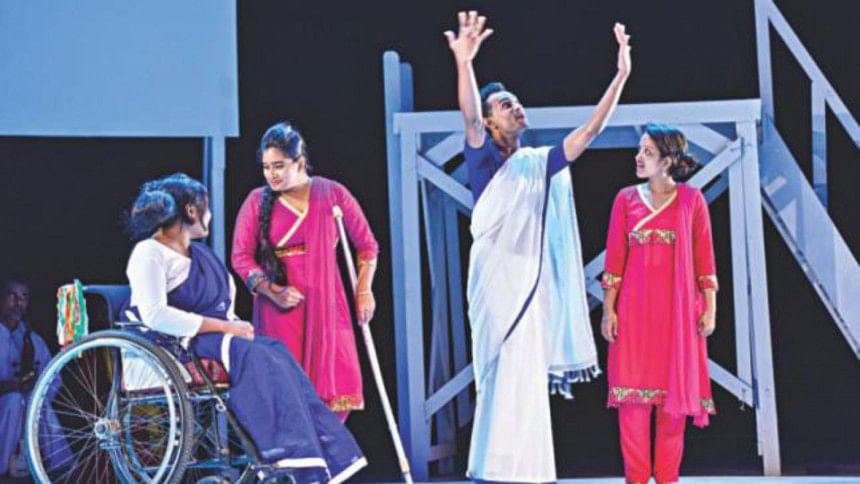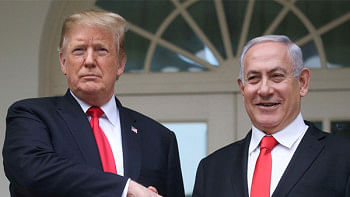Now is the time for global action on disability

On July 24, 2018, the UK government hosts the Global Disability Summit in partnership with the government of Kenya and the International Disability Alliance. Bangladesh is joining more than twenty-six other countries in signing a Charter for Change, and committing to transform the lives of people with disabilities.
Most of us will have witnessed the joy and achievements of the paralympians in the Rio 2016 and London in 2012, and the Invictus Games for wounded soldiers or injured armed forces personnel. And closer to home in Dhaka, no-one who saw it will forget the spell-binding performances by deaf and disabled Bangladeshi actors in "A Different Romeo and Juliet."
These events allow the world to witness what people can achieve when the barriers facing those with disabilities are taken down, when disability is seen as an opportunity rather than a threat, and what matters is what people can do, not what they can't.
But for many, particularly in the developing world, the barriers stand high and condemn people with physical and mental disabilities to lives where they struggle to achieve their potential, condemning those who are unlucky, and those who do not have the support they need, to hardship, poverty and isolation.
The World Bank and the World Health Organization estimate that 15 percent of the world's population—about one billion people—have a disability. And 80 percent of these people live in developing countries. On average, people with disabilities are poorer, and suffer more discrimination, exclusion and violence than the rest of the population. Women and girls with disabilities often face double discrimination due to long-standing gender inequalities, and higher risk of physical and sexual violence.
What is more, we all lose when people with disabilities are excluded. A World Bank study on Bangladesh estimated the cost of excluding people with disabilities and their carers from schooling and employment at USD 1.2 billion annually, or 1.7 percent of gross domestic product. The Bangladesh Household Income and Expenditure Survey (HIES) of 2016 estimated that almost seven percent of the population are disabled in some form.
The data exists but needs to be better used to give a clear picture of the needs and priorities of people with disabilities. We need information on the lived experience of disability, and how this affects social inclusion and access to services, such as health and education, and to employment. It should not be a matter of luck whether people with disabilities receive the support and services they need.
The situation is challenging but we have all seen the hope, joy and success that is possible when the barriers are swept away. So #NowIsTheTime.
Today at the Global Disability Summit, the UK's Secretary of State for International Development, the Rt Hon Penny Mordaunt MP, along with the government of Kenya and the International Disability Alliance are championing the removal of those barriers. The summit brings together global leaders and technology companies to tackle the barriers that prevent people with disabilities in the world's poorest countries from reaching their full potential.
The Charter for Change commits signatories to ensuring the rights, freedoms, dignity and inclusion of people with disabilities. It acknowledges important progress in the decade since the adoption of the United Nations Convention on the Rights of Persons with Disabilities. But the Charter commits us to do more, to strive for real change and achieve the Sustainable Development Goals for people with disabilities.
There is a real opportunity for Bangladesh to make a difference, with its strong disability legislation: the signature and ratification of the United Nations Convention on the Rights of Persons with Disabilities, the 2013 Rights and Protection of Persons with Disabilities (RPPD) Act and the 2015 Rules of RPPD Act. Disability Focal Persons are assigned in all the key line ministries and departments.
We welcome the government of Bangladesh's commitment to launch a new National Plan of Action, currently at the final stage of approval. This will lay out key actions to implement the law. We applaud that the plan has been drafted in consultation with disabled people's organisations as well as civil society organisations. We also welcome the government's commitment to a comprehensive disability survey, which we believe will generate vital information to ensure the plan works and improves people's lives.
For the UK, we are bringing fresh energy to our work in Bangladesh to support people with disabilities, to enable them to reach their true potential, helping them and the whole country prosper. In our UKAid programmes and the British Council's cultural work, we listen to and prioritise people living with disabilities, helping to tackle poverty, skills building and jobs, education, health and justice. In our diplomacy and advocacy, we champion inclusion and empowerment and the rights and needs of people with disabilities, stressing their contributions, economic and social, to society.
Now is the time to act. Now is our opportunity. The British government is committed to working hand in hand with Bangladesh to deliver rights, freedoms, dignity and inclusion for all people with disabilities.
Alison Blake CMG is British High Commissioner to Bangladesh. Jane Edmondson is Head of DFID-Bangladesh. Barbara Wickham OBE is Country Director, British Council Bangladesh.

 For all latest news, follow The Daily Star's Google News channel.
For all latest news, follow The Daily Star's Google News channel. 



Comments